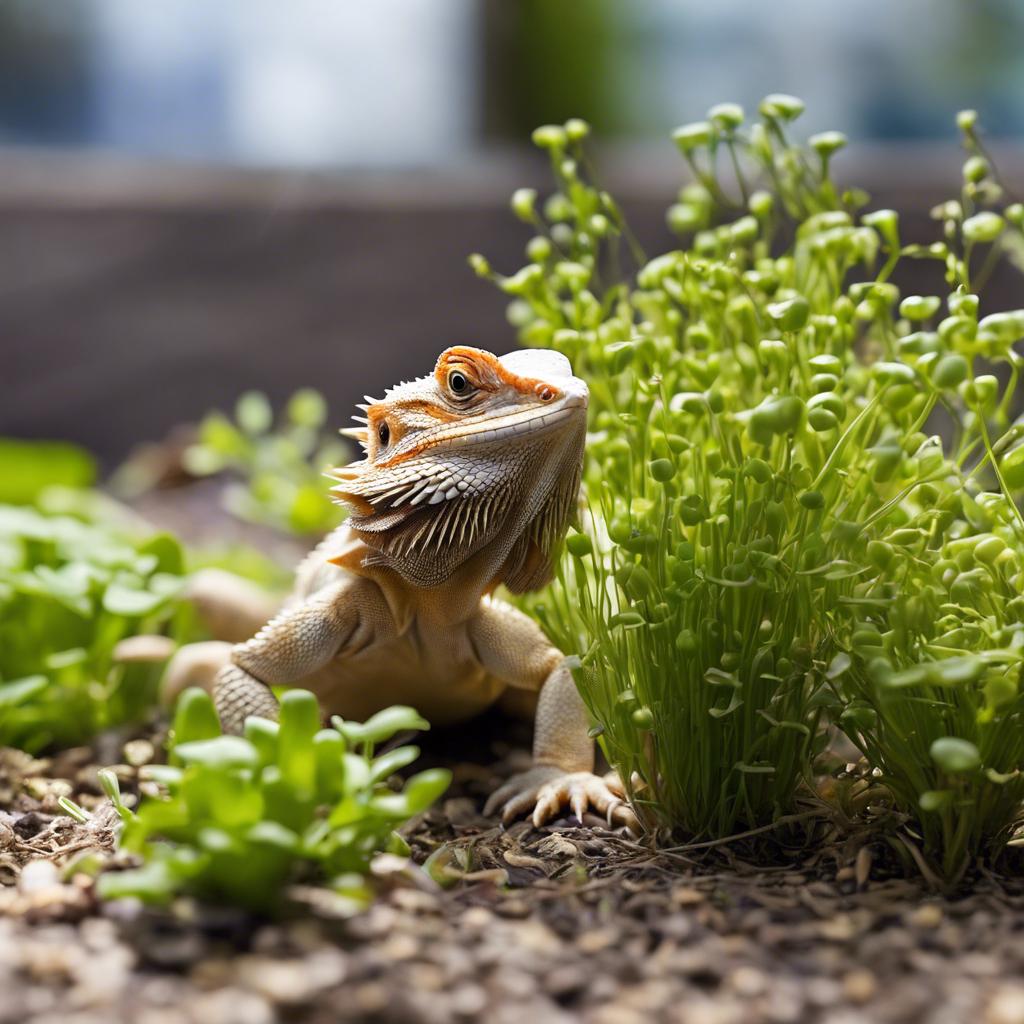Feeding a balanced diet to bearded dragons is crucial for their overall health and well-being. These reptiles require a variety of nutrients to thrive, including vitamins, minerals, and antioxidants. One way to enhance their diet is by incorporating microgreens. Microgreens are young vegetable greens that are harvested just after the first leaves have developed. They are packed with nutrients and can provide numerous health benefits for bearded dragons. In this article, we will explore the nutritional value of microgreens, whether bearded dragons can safely eat them, the benefits of feeding microgreens to these reptiles, how to prepare microgreens for them, and other vegetables and greens that are safe for their consumption.
Key Takeaways
- Microgreens are young plants that are harvested after the first leaves have sprouted.
- Microgreens are packed with nutrients and can provide a variety of health benefits.
- Bearded dragons can eat microgreens as part of a balanced diet.
- Feeding microgreens to bearded dragons can improve their overall health and well-being.
- It's important to properly prepare and balance the diet of bearded dragons to ensure their health and longevity.
What are microgreens?
Microgreens are young vegetable greens that are harvested just after the first leaves have developed. They are smaller than baby greens but larger than sprouts. Microgreens are typically grown from the seeds of various vegetables and herbs, such as kale, spinach, radish, and broccoli. They are known for their vibrant colors and intense flavors.
Microgreens differ from sprouts in that they are grown in soil or a growing medium, while sprouts are grown in water. Additionally, microgreens have a longer growth period than sprouts and develop more leaves. Baby greens, on the other hand, are harvested when they are slightly larger than microgreens but before they reach full maturity.
Nutritional value of microgreens
Microgreens are incredibly nutrient-dense and can provide a wide range of vitamins, minerals, and antioxidants. They contain higher concentrations of these nutrients compared to their mature counterparts. For example, studies have shown that microgreens can contain up to 40 times more nutrients than their fully grown counterparts.
Microgreens are particularly rich in vitamins A, C, and K. Vitamin A is essential for maintaining healthy skin and eyesight in bearded dragons. Vitamin C is an antioxidant that supports the immune system and helps protect against diseases. Vitamin K is important for blood clotting and bone health.
In addition to vitamins, microgreens are also a good source of minerals such as iron, calcium, and potassium. Iron is necessary for the production of red blood cells, while calcium is important for bone health. Potassium helps regulate fluid balance and supports proper muscle function.
Can bearded dragons eat microgreens?
Yes, bearded dragons can safely eat microgreens. In fact, they can greatly benefit from the high nutritional value of these young vegetable greens. However, it is important to note that microgreens should not be the sole source of nutrition for bearded dragons. They should be offered as part of a balanced diet that includes a variety of vegetables, greens, and protein sources.
While microgreens are generally safe for bearded dragons to consume, there are a few potential risks or concerns to be aware of. Some microgreens may contain higher levels of oxalates, which can bind to calcium and potentially lead to calcium deficiency in bearded dragons. It is important to offer a variety of greens and vegetables to ensure a balanced intake of nutrients.
Benefits of feeding microgreens to bearded dragons
Feeding microgreens to bearded dragons can provide several benefits for their health and well-being. Firstly, the high nutritional value of microgreens can help support their overall health. The vitamins, minerals, and antioxidants found in microgreens can contribute to improved digestion, immune function, and overall vitality.
Microgreens are also a great source of fiber, which is important for maintaining a healthy digestive system in bearded dragons. Fiber helps promote regular bowel movements and can prevent constipation.
Furthermore, the vibrant colors and textures of microgreens can stimulate the natural foraging behavior of bearded dragons. This can provide mental stimulation and prevent boredom in these reptiles.
How to prepare microgreens for bearded dragons

When preparing microgreens for bearded dragons, it is important to choose organic and pesticide-free options. Rinse the microgreens thoroughly to remove any dirt or debris. You can then chop the microgreens into small pieces to make them easier for the bearded dragon to eat.
It is recommended to offer a variety of microgreens to ensure a diverse nutrient intake. Some suitable options include kale, spinach, radish, and broccoli microgreens. Rotate the types of microgreens you offer to provide a range of flavors and nutrients.
Microgreens can be offered as a standalone snack or mixed with other vegetables and greens. Bearded dragons have different preferences, so it may take some trial and error to determine which microgreens your pet enjoys the most.
Other vegetables and greens to feed bearded dragons
In addition to microgreens, there are several other vegetables and greens that are safe and healthy for bearded dragons to eat. Some examples include collard greens, mustard greens, dandelion greens, bell peppers, squash, and carrots. It is important to offer a variety of these vegetables and greens to ensure a balanced diet.
When feeding vegetables and greens to bearded dragons, it is important to wash them thoroughly to remove any pesticides or contaminants. Chop them into small pieces or shred them to make them easier for the bearded dragon to eat. It is also recommended to lightly steam or blanch harder vegetables like carrots or squash to make them more digestible.
Importance of a balanced diet for bearded dragons
Providing a balanced diet is crucial for the health and well-being of bearded dragons. A balanced diet for these reptiles should consist of a variety of protein sources, vegetables, and greens. Protein sources can include insects such as crickets, mealworms, and dubia roaches. Vegetables and greens should make up the majority of their diet.
An unbalanced diet can lead to various health problems in bearded dragons. For example, a diet that is too high in protein and low in vegetables and greens can lead to obesity, liver disease, and kidney problems. On the other hand, a diet that is too high in vegetables and greens and low in protein can lead to malnutrition and stunted growth.
It is important to provide a variety of foods to ensure a diverse nutrient intake. This can help prevent nutrient deficiencies and promote optimal health in bearded dragons.
Bearded dragon care tips
In addition to providing a balanced diet, there are several other care tips that are important for keeping bearded dragons healthy and happy. Firstly, it is crucial to provide the proper lighting and temperature for these reptiles. Bearded dragons require UVB lighting to help them produce vitamin D3, which is necessary for calcium absorption. They also need a basking spot with a temperature of around 95-105°F (35-40°C) to regulate their body temperature.
It is also important to provide a suitable enclosure for bearded dragons. The enclosure should be large enough to allow for movement and should include hiding spots, climbing branches, and a shallow water dish for drinking and soaking.
Regular veterinary check-ups are also important for monitoring the health of bearded dragons. A veterinarian experienced with reptiles can provide guidance on proper nutrition, husbandry, and any potential health concerns.
Feeding microgreens to bearded dragons can provide numerous health benefits due to their high nutritional value. Microgreens are packed with vitamins, minerals, and antioxidants that can support digestion, immune function, and overall vitality in these reptiles. While microgreens are generally safe for bearded dragons to consume, it is important to offer them as part of a balanced diet that includes a variety of vegetables, greens, and protein sources.
Incorporating microgreens into a bearded dragon's diet can be as simple as rinsing them, chopping them into small pieces, and offering them as a snack or mixed with other vegetables and greens. It is important to choose organic and pesticide-free options and to provide a variety of microgreens to ensure a diverse nutrient intake.
By considering the nutritional needs of bearded dragons and providing a balanced diet, along with proper care and husbandry, you can help ensure the health and well-being of these fascinating reptiles.
If you're wondering whether bearded dragons can eat microgreens, you'll find all the answers you need in this informative article from Reptile Wizard. Microgreens are tiny, nutrient-packed greens that are harvested when they are still young. They are often used in salads and as garnishes, but can they be a part of a bearded dragon's diet? Find out more about the benefits and potential risks of feeding microgreens to your bearded dragon by checking out this article: Can Bearded Dragons Eat Microgreens?
FAQs
What are microgreens?
Microgreens are young plants that are harvested after the first leaves have developed. They are usually between 1-3 inches tall and are packed with nutrients.
Can bearded dragons eat microgreens?
Yes, bearded dragons can eat microgreens. They are a great source of vitamins and minerals for your pet.
What types of microgreens can bearded dragons eat?
Bearded dragons can eat a variety of microgreens, including kale, broccoli, alfalfa, and clover.
How should I prepare microgreens for my bearded dragon?
Microgreens should be washed thoroughly before feeding them to your bearded dragon. You can chop them up into small pieces or offer them whole.
How often should I feed my bearded dragon microgreens?
Microgreens should be offered as part of a varied diet for your bearded dragon. They can be fed a few times a week, but should not make up the majority of their diet.
Are there any microgreens that are toxic to bearded dragons?
Some microgreens, such as onion and garlic, can be toxic to bearded dragons and should be avoided. Always research the specific type of microgreen before feeding it to your pet.

